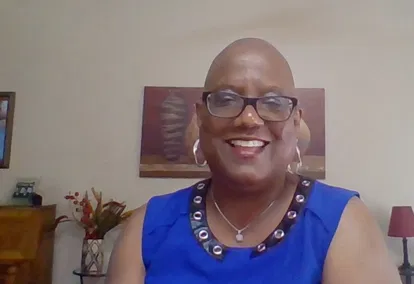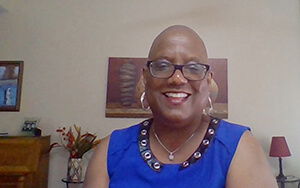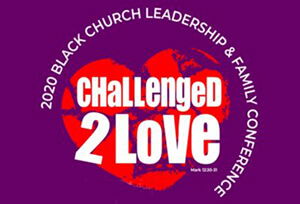2020 Black Church Leadership and Family Conference Includes Focus on WMU’s “Sisters Who Care” Ministry
July 30, 2020

NASHVILLE, Tenn.—Southern Baptists’ annual Black Church Leadership and Family Conference took on a significantly different look and feel this year. Like many other events across the nation, the 2020 gathering shifted from in-person to online amid the ongoing COVID-19 crisis.
But that didn’t deter Black church leaders, including Woman’s Missionary Union’s “Sisters Who Care,” from producing vibrant, interactive missions, ministry, discipleship and leadership training. The five-day online conference, held July 20-24, featured approximately 100 virtual breakout sessions as well as daily livestreamed Bible exposition and evening worship services.
“I think we can all agree these are challenging days – the pandemic, racial tensions, unemployment, sickness, death and more,” said conference coordinator Mark Croston, national director of LifeWay Christian Resources’ Black Church Partnerships. “That’s why we did not want to cancel our 2020 Black Church Leadership and Family Conference.”
Noting that this year’s online conference was offered free of charge to participants, Croston added, “Our theme, ‘Challenged 2 Love,’ is right on time for this moment.” The theme is based on the words of Jesus in Mark 12:30-31 to “love the Lord your God with all your heart and with all your soul and with all your mind and with all your strength” and to “love your neighbor as yourself.”
The annual event, hosted by LifeWay, marked the conference’s 27th year. Usually held at Ridgecrest Conference Center in North Carolina, BCLFC is promoted as “the premier worship and leadership development event for Black churches.” While the onsite conference typically attracts about 1,200 people, last week’s online version far exceeded that number with more than 4,500 registered participants.
A diverse lineup of workshops ranged from “Internet Preaching” and “Meritorious Marriage” to “Black Millennials and the Church” and “The Emotionally Healthy Pastor.” Amid heightened racial tensions across the nation, other breakout sessions addressed such issues as “The Church and the Racial Divide” and “Break the Power of Prejudice.”
Serving Beyond the Church Walls

Sisters Who Care, which Valerie Carter Smith describes as “Women on Mission contextualized or customized for the African American church,” also was among featured conference tracks.
Carter Smith, executive director of Woman’s Missionary Union of Virginia, serves as National WMU’s volunteer coordinator for Sisters Who Care. She said the Sisters Who Care structure was designed “to get Black women to see that WMU is valuable, that there is a place for them in WMU, that there is a place for them to come to the table and to partner.”
“Historically, we as African American Christians have always been on mission,” Carter Smith affirmed. She said that meshes well with WMU’s focus on “the Great Commission and that’s why we do our work and the Great Commandment of loving our neighbors – all of our neighbors – as we love ourselves and love God.”
Leading a WMU overview session as well as a workshop on “Lead Like Jesus: Starting a Sisters Who Care Ministry,” Carter Smith said African American churches can support missions through a variety of WMU-related ministries such as Baptist Nursing Fellowship; Christian Women’s and Christian Men’s Job Corps; Pure Water, Pure Love water projects; WorldCrafts fair trade products; and the Lottie Moon Christmas Offering for International Missions and Annie Armstrong Easter Offering for North American Missions.
“I always suggest that we take a fresh look at how we’re living out missions in the life of the local church,” Carter Smith emphasized. “How are we getting out of the walls of the church and into the streets and into the community here and around the world?
“WMU ensures that people of all ages can be involved in hands-on missions and can be involved in mission groups from preschool to senior adults,” she explained. “WMU equips and mobilizes the church to be on mission. It’s as simple as that.”
Connecting Missions and Ministry

“One of the things that I learned quickly was that both WMU and LifeWay Women had some marvelous resources and some great leadership training,” she shared. “As we began our work as church planters, I also learned very quickly that we just didn’t have the capacity to have a WMU and a women’s ministry group so what I wanted to do was to equip the leadership that I did have to do it all. I wanted the best of both worlds.”
Citing her desire “to combine the missions and the ministry focus,” Fountain said, “It was just as important to grow in Christ, to be strong disciples and for that to pour over into missions service. Rather than dividing our workforce, I advocated for us coming around the table and figuring out how we could work together to be our best for Christ. To me, it was just a win-win to do both.”
“I don’t want to be educated just for the sake of education. I don’t want to be spiritually strong just for me,” she emphasized. “I want to be spiritually strong so that He can use me to help someone else, to help others to grow, to help others to see how He can use them in service.”
Evaluating Missions Relevance
Michelle Fergus, a member of WMU of Texas’ African American Advisory Counsel for Sisters Who Care, led a breakout session titled “Missions Relevance Test: Are You Really on Mission?”
Fergus, who has a background in process improvement management, posed the question to church leaders: “Are you doing drive-by, statistics-driven missions or are you creating relevance for those you’re ministering to?”
Encouraging churches to determine whether their mission efforts are producing long-term impact, she urged individuals, leaders and churches to evaluate what mission actions and strategies they should keep doing, stop doing and start doing.
“To me, the Missions Relevance Test is a moment of self-check for the individual but also for the church because I think leaders have the tendency to sometimes become deeply entrenched in the way they think, in the way they operate and in the way they lead people,” Fergus said. “It is definitely a personal challenge to stop and think about what God has called us to do as individuals and then use that exercise to have a group discussion that will hopefully bring impact and change.”
Citing the Black Church Leadership and Family Conference’s transition to an online setting amid the coronavirus pandemic as a timely illustration, Fergus said, “I actually think our current situation is a great example of why we need continuing development. How do we pivot when things unexpectedly come up? How do we continue to reach people when there are technology barriers?
“My personal opinion is this pandemic was kind of a measurement tool to show how equipped we really are to deal with the unexpected,” she concluded. “It’s just very telling of where we are versus where we need to be and you can’t get there without training.”
By Trennis Henderson, WMU National Correspondent